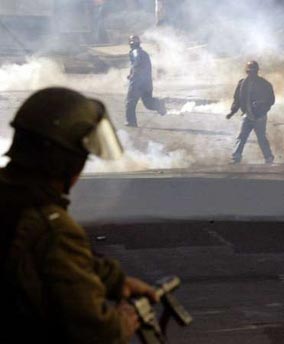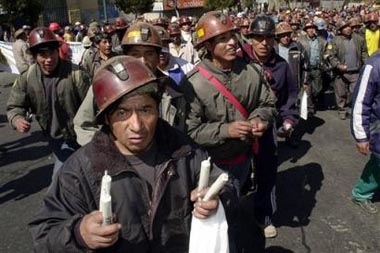
June 2005
Pitched Battles in the Streets of La
Paz
 Bolivian
tin miners from Caracoles run from tear gas during fighting in the
Bolivian capital June 7. Tens of thousands of workers and peasants
surged through La Paz, fighting running battles with police and army.
Bolivian
tin miners from Caracoles run from tear gas during fighting in the
Bolivian capital June 7. Tens of thousands of workers and peasants
surged through La Paz, fighting running battles with police and army.
(Photo:
David Mercado/Reuters)
LA PAZ,
JUNE 7 – Pitched
battles erupted in Bolivia’s capital Tuesday, after last night’s
announcement
by President Carlos Mesa that he had submitted his resignation to
Congress.
With a
notable escalation of government repression, the
fiercest confrontations were between police and miners who occupied the
steep
streets around the central Plaza San Francisco. Workers, slum dwellers
and
peasants tried once again to fight their way into the Plaza Murillo,
seat of Bolivia’s
government. For many hours thereafter, dynamite blasts alternated with
the
firing of teargas and plastic bullets. The dynamite explosions were
even more
deafening than yesterday: the miners broke the dynamite sticks into
pieces (“cachorros”) that were twice as large as
before.
Armed
soldiers came down from the barracks to occupy Plan San
Francisco and “guard” several trucks seized from the miners, saying
dynamite
and a rifle were found inside. Various demonstrators were hospitalized,
reportedly including at least two seriously wounded miners; more than
50 were
arrested.
In disciplined
ranks, miners from the Caracoles cooperative marched down the Prado,
the capital’s central boulevard, proudly displaying their dynamite.
They were met with applause, as the miners are seen as the embodiment
of the history of struggle of Bolivia’s working people. After the
vicious privatization of the mines carried out two decades ago,
cooperative miners have repeatedly clashed with miners working for
wages at private mines as well as those few owned by the government.
The fact that both cooperative and salaried miners came out in force
today, using their dynamite to hold off waves of police attacks, was
highly significant.
Streets were torn up and the paving stones – together with wood, tires, street signs and debris – were used to build barricades all along the streets in the old colonial sector of the city, which was enveloped in vast clouds of tear gas. Aymara women in traditional dress were doubled over, vomiting and pleading for water as the gas bit into their lungs. (The effect of the gas is intensified by the thin oxygen at the high altitude.) Street vendors, market women and passersby screamed at the police in outrage at the attack on the demonstrators.
In the late afternoon, a woman worker took refuge in a
coffee shop with her young daughter after fleeing a new round of gas:
“the police fired gas at us just for looking at the miners’ trucks they
seized and saying what we thought about it.” Her father and grandfather
were miners, she said, and “this whole country used to live off what
the miners produced. Now it’s gone and there’s gas, but the Santa Cruz
politicians want to grab the money for themselves.” After her husband
lost his job, she went to Brazil to work “under lock and key” in a
textile sweatshop in São Paulo, but the few dollars she made
were taken away by the immigration police.
Marching
past the transit police barracks, a column of
peasants chanted “Fusil, metralla, el
pueblo no se calla” – Neither rifles nor machine guns will silence
the
people. This particular contingent came from Cochabamba, Oruro and
areas in
Bolivia’s east, which is run like a private fiefdom by the “white”
elite
lording over a largely indigenous population.
Referring
to the reactionary heads of Congress and of the
House of Representatives, Humberto Vaca Díez and Mario
Cossío, the marchers
chanted: “Vaca, Cossío, la misma
porquería” – Vaca, Cossío, the same crap – and “Vaca al matadero”: Vaca (Cow) to the slaughterhouse.
Backed by
the Organization of American States (and its
master, U.S. imperialism), Vaca Díez insisted today that the
presidential
succession must be “orderly” and “constitutional,” meaning that he
should
become president. Next in line are Cossío and the head of the
Supreme Court,
another associate of the despised former president “Goni” (Gonzalo
Sánchez de
Lozada), who fled in the face of the October 2003 uprising. What all
the
bourgeois commentators agree on is that the present “vacuum of power”
cannot
continue.
With the support of key parties from Goni’s coalition, Vaca
Díez declared yesterday that Congress will convene in the city
of Sucre on Thursday to vote on
Mesa’s resignation and who will succeed him,
declaring that the “presence of the state” is necessary to “impose order.” In response, Mesa went on national television to plead with
Vaca Díez not to take over the presidency because then “we will have a
Congress without results, and we could have an explosion” and “a civil war.” Stressing that his
own resignation is “irrevocable,” Mesa came out in favor of early elections.
While
the Santa Cruz senator is the darling of many rightist sectors, others
openly
prefer a military coup. The idea of Vaca Díez becoming
president, and his bellicose posture towards current protests, is
viewed by many demonstrators as willful provocation; he is rightly
denounced as a partner in all the massacres carried by the
megacoalition of rightist and “moderate” bourgeois parties that put
Goni in office.
As
polarization continues to deepen, some middle-class
residents in the city center yelled “Indians go home” and other racist
insults.
Meetings were held in a number of affluent neighborhoods to discuss
“defense”
against the demonstrators, who in the nightmares of the elite are the
reincarnation of the Tupac Katari Indian rebels who besieged colonial
La Paz in
1781.
 Miners
prepare to battle police and army with dynamite in La Paz, June 7. The
offer by President Carlos Mesa to resign leaves vacuum of power, as
rightists plot military coup. (Photo: Juan Karita/AP)
Miners
prepare to battle police and army with dynamite in La Paz, June 7. The
offer by President Carlos Mesa to resign leaves vacuum of power, as
rightists plot military coup. (Photo: Juan Karita/AP)
Attempts
to defuse the conflict through “mediation”
continued, with splits among slum dwellers organizations in El Alto
regarding
negotiations with the government. Meeting with Church leaders preaching
the
gospel of “dialogue,” Evo Morales, the peasant leader who heads the
reformist
Movimiento al Socialismo (MAS), declared his support for early
elections.
Meanwhile, the La Paz daily La Razón
(7 June) reported that “as a result of pressure from its base,” the MAS
had
“hardened” its position to come out for nationalization of oil and gas
– the
predominant slogan in these days’ protests – while asking for “the
formation of
a pre-Constituent Assembly.” In other words, a body even more impotent
than the
empty Constituent Assembly Morales has demanded over the past years.
On the radio, in
the midst of today’s battles, constant
advertisements funded by “NGOs” (supposedly “non-governmental”
organizations
actually funded by imperialist agencies) extol the virtues of the
promised
Constituent Assembly, for Indians, for women, for youth, etc. Denounced
by
mouthpieces of U.S. imperialism, Morales has sought to prove his
respectability
and “reliability,” seeking support from the NGOs as well as European
social
democrats, Lula’s popular front in Brazil, and Hugo Chávez of
Venezuela.
One of President
Mesa’s last acts was to call mid-October
elections to a Constituent Assembly linked to a referendum on the
ultra-reactionary demand for “autonomy” of Santa Cruz and other oil and
gas-rich areas whose rulers want more dollar profits for themselves.
The
eastern bourgeoisie has repeatedly opposed even token juridical
recognition
of the existence of multiple ethnic
groups in Bolivia, whose Aymara, Quechua, Guaraní and other
indigenous peoples
have been brutally oppressed for centuries.
Today’s bitter
escalation of class battles gave the lie once
again to the democratic illusions spread by Morales and others,
including
centrists on the left (see “Bolivia
Explodes in Sharp Class Battle”). Even as
the right wing demonstratively held off reconvening Congress, the MAS
parliamentary delegation showed up anyway, just to demonstrate their
loyalty to
the “institutional” framework that has proven incapable of fulfilling
even the
most elementary needs of the masses.
On the streets,
in the markets, in taxis, everywhere,
Bolivians speak with contempt of Carlos Mesa as the president “que no pudo” – who couldn’t. The
“instability” convulsing this country (and much of Latin America), is
not
fundamentally caused by passing political phenomena. The convulsions
are caused
by the capitalist system, which is
manifesting growing instability on an international
scale.
Today’s
confrontations ended in a new impasse. On the streets
people meeting each other for the first time ask “What is the way out?
Why is
nobody showing what needs to be done?” While the masses are enraged at
the
bourgeois government, they are still asking it to solve the nation’s
problems,
notably through nationalization of oil and gas.
In the absence
of revolutionary leadership, they have not
reached the awareness that the working masses themselves are the only
ones who
can begin to solve these problems: this means the proletariat taking
power at
the head of all the oppressed. Workers and peasants defense groups (the
basis
for workers and peasants militias) are a burning necessity of the day,
as is
the formation of workers, peasants and soldiers councils
to
organize the exploited and oppressed masses in struggle. These councils
could
then form the basis for a worker-peasant-Indian government.
In the struggle to build a genuine Trotskyist party in Bolivia, deep roots can be sunk among the masses in the course of the present battles. As combative miners fight their way through clouds of tear gas, the situation cries out for revolutionary leadership to combat the petty-bourgeois nationalist misleaders and provide a clear program for proletarian power. The crucial task in these tumultuous days is to forge the nucleus of such a party that can lead the way to international socialist revolution. n
To contact the Internationalist Group and the League for the Fourth International, send e-mail to: internationalistgroup@msn.com